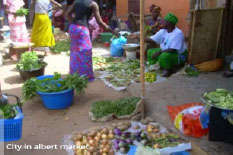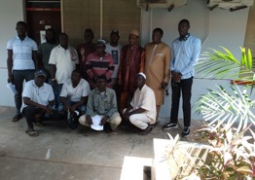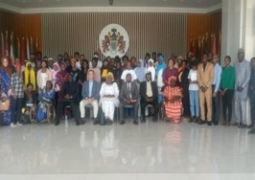
From small and medium businesses to even big developed ones, the worst experience is felt across.
For petty traders at Albert market, the country’s biggest urban market, the severity and profit loses experienced as a result of the global pandemic has been devastating.
Market vendors some of whom spoke to this medium disclosed their frustration and hardship they continue to endure daily.
Despite their challenges, they are looking forward to better days when their hopes and dreams would turn into reality.
In recent article published by a local media brought to light how some women entrepreneurs, who have been engaging in petty trading for survival and taking care of their social needs, have shifted to farming due to the pandemic, which ground businesses to a halt for most part of 2020.
Abdou Sowe, a petty trader in Banjul Market, who owns a cosmetics shop, explained that he has been in the business industry since 1994 and that he has never faced any difficulties in losing profits.
Sowe explained that he gathered his entire monthly profits and he saved it at the bank. He, however, lamented that the pandemic has affected his business seriously as the challenges he faced include low customers turn out, which he said, has significantly reduced his profits.
He hinted that price hikes on the importation of the products, also makes it difficult to resell his products to local customers.
“There is no profit now in the business, honestly even to get transport to go back to your home is a problem. We are pleading with the government to help us stabilise the prices of products in the country.”
Innesse Diousse is a vegetable seller and for her the pandemic has become a great obstacle to her thriving business.
She said that since the advent of Covid-19 she has been faced with huge losses in terms of profit, adding that when she got her vegetables she cannot resell it at a more favorable price.
This, she added, has left many customers complaining about high price.
“In the end I had to resort to selling my vegetables at a very reasonable price, which always have a great impact on my profit. The price I got these vegetables from the distributors is always high and that when I sell it to my customers they complain of high costs.”
As a young mother and having to take care of her children in such a demanding experience, Diousse said sometimes her vegetables ends up getting rotten.
“I end up losing my money spent in buying these vegetables. I sometimes get angry and frustrated and this is why I stayed at home for one week without coming to the market due to the big loses”
She called on government to come to their aid now as they have families to feed and his business, which he entirely depends on, is not like it used to be.
Omar Kassama, a petty trader at the Banjul market also reiterated similar problems. He noted that during the peak of the pandemic, government was forced to close down public places including the Banjul market which he said, hampered his business.
The move, he added, has since forced them to the corner, thus finding it very difficult to recover for that loss, making business so slow.
“The hikes of the prices of the commodities has made business so difficult, sometime you just have to sell the products without any profit to be able to get your capital,” Kassama disclosed.
“Sometimes you buy one product at a particular price and the next day the price has gone up,” he lamented.
He urged government to help them in ensuring stable market especially for imported products, while challenging authorities to also engage the relevant stakeholders on the issue of the price hike.
Ndey Gaye, a catfish vendor also experienced similar problem. For her, the business environment has drastically gone down due to the pandemic. “We are living from hand to mouth, due to the low sales.”
She thus called for government support to help their recovery from the pandemic and to be able to boost their business.
The corona virus was declared a global pandemic by the WHO and as at March 25th, 2020 there have been 413,467confirmed cases and 18,433 deaths.
It would be recalled that The Gambia registered its first case on March 17th, 2020; an imported case but this increased to 3 confirmed cases (all imported) and1death within the space of one week.
The Minister of Finance and Economic Affairs stated that the economic impact of the COVID-19 outbreak would be a loss of GMD2.5 billion and that the economy will shrink by 3 percentage points to 3.3 percent from a projected growth rate of 6.3 percent in 2020.
This will also have implications on the budget and net domestic borrowing negatively impacting the concessionary fiscal stance the Government had been undertaking in recent years.
This story was produced with support from Journalists for Human Rights (JHR), through its Mobilizing Media in the Fight Against COVID-19 in partnership with Mai-Media




